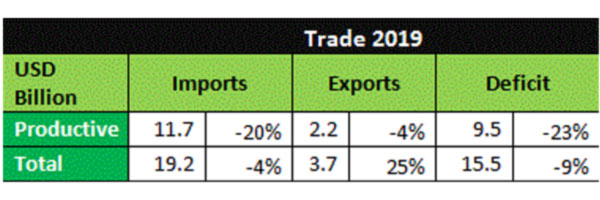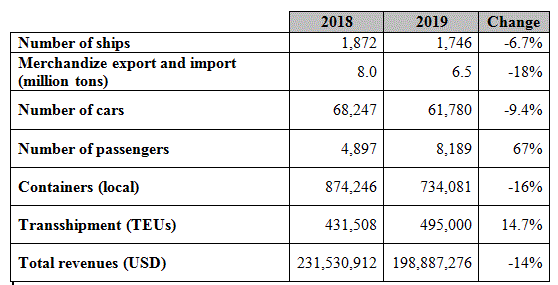Exports
and imports are down
| Share |
|

|
|

|
|
|
|
Productive exports, which exclude from total exports fuels and oil products as well as jewelry and precious metals and stones, were stable in 2019, at $2.2 billion, slightly below $2.3 billion in 2018. When the excluded numbers are factored in, official export figures show an increase of $700 million over the previous year to reach $3.7 billion.
Productive imports, also excluding fuels and oil products as well as jewelry and precious metals and stones, fell by round $3 billion to $11.7 billion in 2019. When the excluded numbers are factored in, imports drop to $19.2 billion from nearly $20 billion in 2018. Almost all import categories, excluding fuels and oil products, decreased due to capital controls which have prevented paying foreign suppliers. Demand was also down due to a recession in the economy.
The large difference between productive imports and overall imports is mostly attributed to a drastic change in how imports of fuels are accounted for. Total import figures have increased due to a change in bookkeeping. Fuels were underreported in previous years, and readjusted in 2019 figures – thus leading to a distortion in the trends.
As a result, the trade deficit has shrunk by 23 percent on productive items to $9.5 billion. It narrowed by nine percent in the distorted total (official trade deficit) to $15.5 billion
Saudi Arabia was the top destination of ‘productive exports’ with reached $238 million (11 percent of the total), an 18 percent increase from 2018. The largest categories of exports to that country consisted of foodstuff and chemical products. Exports to Syria, excluding fuels and oil products, surged 4.5 times to $152 million, and consisted mainly of plastic products. Mounir Bissat, Head of International Affairs at the Association of Lebanese Industrialists, said that part of exports to Syria could be made up of re-exports.

Source: Customs
Hani Bohsali, Chairman of the Syndicate of Importers of Foodstuffs, Consumer Products and Drinks said that importers are focusing increasingly on cheaper brands. The foodstuff import bill, which is usually at around $3 billion, has dropped by over 25 percent of their value a year ago.
Adel Abi Chaker, Chairman of ManyFood, an importer and producer of foodstuffs said that sales of high-end food products have dropped as the purchasing power of consumers has declined. “This is leading to pressure on our profitability and we are trying to break even. We had to lay off part of our employees in order to cut costs and avoid going bust,” he said.

Source: Port of Beirut
Reported by Shikrallah Nakhoul
Date Posted: Feb 05, 2020
| Share |
|

|
|

|
|
|
|